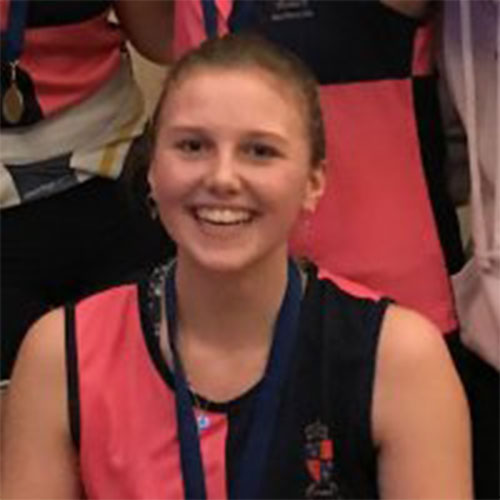Shrewsbury
Futures Feature - To IBM and Beyond


In the first Salopian interview feature from the Futures Faculty, Chris Wain, Head of Futures, talks to Olivia Moir about her progression since leaving Shrewsbury School.
Olivia Moir was Head of School last year, and is currently enjoying a year out, which is not uncommon for many of our leavers. What Olivia is doing though is slightly unusual, having secured herself a one-year paid internship with the global giant that is IBM, before heading to Durham University in 2021. Chris Wain, Head of Futures caught up with Olivia earlier in the week to find out how she was getting on, and what prompted her to go down this route.
CW: Great to speak to you, and well done on securing this internship! How did it come about?
OM: Back in January (2020) I began several application processes for school-leaver internships. I’d had my heart set on a year in industry before starting University since I was 14 when my brother did exactly this. Not only did he have an incredibly fun year but he also gained invaluable work experience. Internships of this kind are sought after and so tend not to be very well publicised (because they don’t need to be) and are often overshadowed by the more widespread graduate recruitment campaigns. That said there are quite a number of well known (and not so well known) firms who offer them: for example IBM, Schroders, Invesco, Nova and Standard Life Aberdeen to name a few. There is even a gap year scheme for young Army officers called a Short Service Limited Commission.
CW: I’m aware that competition for these opportunities can be fierce. What were your experiences like of the recruitment processes?
OM: I can testify to the competitive nature of these because I applied for several and was pleased to be offered a job by IBM, despite not making it to this stage with any of the others. The application processes are competitive and can be quite complicated. Each process is slightly different but they tend to follow a similar structure. From first submitting my application to being offered the job with IBM I had to jump over five major hurdles.
The first was submitting a CV alongside a brief covering letter and a few sentences on why you think you would be well-suited for the role. From there, you are then invited to explain why you have certain skills such as teamwork, communication, leadership, patience etc. and why you are therefore a good fit. If your submissions are up to scratch you are then asked to complete several online tests: for example a cognitive ability, situational judgement and a personality test.
It’s after the testing stage that I think most people get rejected, it happened to me on several applications, and the few who remain are usually then invited to attend an Assessment Centre, where the most promising candidates are put under the spotlight. It can feel grueling but is also enjoyable.
You will be asked to prepare a presentation that you then deliver to a panel of three, in the case of IBM. It must consist of experiences and characteristics that make you a good fit for the role but it must also include some recognition of work by IBM that interests you and through the discussion of which you can demonstrate:
- That you can undertake research under your own steam and then
- Communicate clearly and well in a way that connects their business to you and your personality, interests and skillset to demonstrate a strong fit between you and the company.
Over the course of the Assessment Centre you will also partake in group tasks and exercises with other applicants and you are judged on the way you cooperate and interact with other people. For me this entire experience was slightly different because of Covid-19 as my Assessment Centre had to be virtual. It was a rather strange experience that tested my technical skills at the same time as trying to impress but I enjoyed it and was very pleased to make it through.
CW: This sounds very intense, but reflective now of how many of these global organisations recruit for their opportunities. What happened next?
OM: In March I was told that, despite being ‘accepted’ by IBM, due to Covid-19 there were no available roles arising in the business units and, despite successfully getting into the pool, there was nothing for me beyond that. Nevertheless, I kept in touch with the IBM HR team handling the process and continued to express interest every few weeks and to ask whether the situation had changed since my last contact with them.
Completely out of the blue in June I was emailed by a member of Bluewolf, (an IBM business unit, which specialises in the distribution of Customer Relationship Management software), who is now my boss, and was offered an interview in less than 24 hours. I am sure they contacted me in part because I had kept in touch with them and continued to express strong interest. I was on holiday in Italy at the time and spent as much time as I could to prepare as well as I could. My interview was online and was very nerve-wracking, lasting around 45 minutes. A week later I received a telephone call and was offered the role, which I accepted on the spot.
CW: I suspect that you must have previously engaged in other opportunities though to have even been considered for this role?
OM: Yes, I’ve also been involved with a couple of other work experience schemes. I cannot stress enough the value of work experience generally. As a Salopian I have been blessed with a very special and all-round education. My experiences at school like going to Malawi, performing at the Edinburgh Fringe, being a member of the choir, the Boathouse and indeed the odd opera and musical helped my application to IBM immeasurably. However, it’s very easy to get absorbed in the bubble, which is Shrewsbury School, and to forget that, in later life, real-world experience is what can really set you apart from other candidates applying for jobs.
JP Morgan offer a week for students in the Summer of their Lower Sixth where they gain office experience and learn how to interact within a team. I learned about this opportunity during the JP Morgan ‘Summer of Learning’ which was a series of online seminars, implemented because of Covid-19.
McKinsey and Company also offer a fantastic programme called ‘Leadership Academy’ which I was lucky enough to be selected for this summer. Surprisingly, the application process for the Leadership Academy was relatively straightforward, as the only thing required is the submission of a CV. Around 100 students get chosen to join the Leadership Academy per year and the best thing is that you can continue to return to McKinsey each Summer and continue to gain fantastic experience and meet more and more people; continuously growing your network. I met some phenomenal students and learnt some incredible things from people from all over the country many from very different backgrounds, who were my age.
When it comes to applying for Spring Weeks (first year of University) and Summer Internships (second year of University), I hope that it is these sorts of experiences that will make the best candidates stand out; so it is well worth starting out on this journey as early as you can. I just feel any kind of work experience is helpful because no matter where you acquire this, you will still be picking up experience of valuable and transferable skills like efficient communication and teamwork which broaden your understanding of the world of work and show prospective employers that they will not be taking a risk in recruiting you.
CW: Olivia, thank you for taking the time to talk to me. I look forward to catching up again soon to hear how the internship is progressing. Congratulations again on securing this role.












.png&command_2=resize&height_2=85)




.JPG&command_2=resize&height_2=85)



